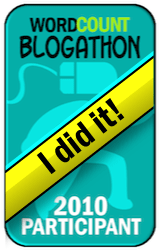 I run into a lot of brands in my business as a travel writer, but not the kind I'm looking for now. What I generally see might be located on an animal's hide, on the end of an iron stick, or maybe even burned into a log cabin wall. That's not the kind of brand I'm looking for these days.
I run into a lot of brands in my business as a travel writer, but not the kind I'm looking for now. What I generally see might be located on an animal's hide, on the end of an iron stick, or maybe even burned into a log cabin wall. That's not the kind of brand I'm looking for these days.These days, I'm looking for my own brand--and I certainly don't want it emblazoned on the bottom of my butt!
Thank goodness that's not necessary for you to be able to see who I am and know what I'm all about.
But sometimes, I'm not even sure.
As I work towards a successful freelance writing life, in addition to my speaking career that involves the self-development work we discuss here, it's become increasingly obvious to me that I need to begin the official branding process. I need to know who I really am and what I'm really all about so I can be as clear with my message as possible (And if I have more than one, I want to know how to best share that as well.). It's one thing to post on Twitter, sign up for groups on LinkedIn, and engage in networking conversations in person. But am I sending a clear message about what I do, what I represent?
I'm not 100 percent certain. So when I met Sherry Paprocki at this year's American Society of Journalists and Authors conference in New York this past April, we started talking about this very topic. It helped that she and her husband wrote a book on it. I picked up a copy, which Sherry gladly signed ("To a great time enhancing your brand," she wrote). Part of the "A Complete Idiot's Guide," it's a very practical book on learning how to brand yourself. In fact, that's what it's called, Branding Yourself.
And I have a lot of questions that I hope it will answer...What am I all about? What kind of message am I sharing with the world? Am I projecting an image that spells all of that out? When you look at me, or meet me, do you see what I want you to see?
You might be interested to know that I am, in fact, finding those answers inside of this book. Indirectly, of course. The authors don't know who I am, but they provide very specific thought-provoking questions (What am I known for? What do I want people to say about me at my retirement party? How many upcoming meetings do I have on my calendar with people who will enhance my professional abilities?) that are helping me to dissect who I am and how I can best project--and protect--that image with the world that is my audience.
The authors define a personal brand as "an authentic depiction of you who are, what skills you have developed, and what value you can bring to your work." Your brand helps you get noticed, "to stand out," they say.
But you want to make sure you're standing out in a good way, and they help you figure out how you can best do that, acknowledging you may need a little outside help: graphic designers, image consultants, media training, and other professional advice, guidance and expertise.
Because this is part of my BIKE philosophy already, I'm really enjoying the process of getting to know myself better. I've just completed Part 1 of the book, the part that helps define the word and how you can begin to define it for yourself. I've learned a lot but have three other parts of the book to complete before I'm closer to finding what I'm looking for. For now, I have, at least, written an intial branding statement. It goes like this:
"Hi, I'm Jackie Dishner, also known as The BIKE Lady. I'm an author and speaker who uses a special brand of BIKE to move your life forward."
I'm not sure if that's the final statement, but it's what I have to work with for now.
One of the next steps I need to take is to ask friends, family and colleagues what they think about me, my skills and personality. I can read through past testimonials to get some idea. But I'm going to consider this part of the work carefully. Who really knows me well enough to offer honest input? In the next two weeks, I'll pick five people to ask. I'm a little anxious about what they have to say. I think I know, but...
If you were doing your personal branding work today, do you know who you might ask for insights? Better yet, do you know what they'd say about you?













